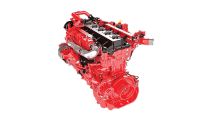Navistar, Clean Energy Set Pact to Cut Natural-Gas Engine Costs
By Howard S. Abramson, Editorial Director
LISLE, Ill. — Navistar Inc. and Clean Energy Fuels Corp. unveiled a joint offensive on Feb. 1 to expand the reach of natural-gas-powered vehicles in the heavy-duty trucking market.
Truck and engine maker Navistar has agreed to provide natural-gas versions of its truck engines, and fuel provider Clean Energy will provide incentives to fleets to make up for the $35,000 extra cost that applies to trucks that run engines that burn the fuel.
In return for the commitment to cover the extra cost, fleets must commit to purchase minimum levels of fuel from Clean Energy, at a price above the current market price for natural gas, but below the cost of diesel.
“Natural gas has clearly emerged as the most realistic alternative fuel option for the trucking industry,” Dan Ustian, Navistar’s chairman and CEO, said during a press conference at the company’s new headquarters here.
He said the joint program with Clean Energy guarantees fleets “a quicker payback on their investment, plus added fuel costs savings from day one of operation.”
T. Boone Pickens, a major in-vestor in Clean Energy and a natural gas advocate, called it “the cheapest fuel in the world,” and one that is abundant in the U.S. Pickens, president of B.P. Capital, said, “We’re focused on heavy-duty trucks because they’re the biggest users of fuel.”
One of those users, Jerry Moyes — who is chairman and CEO of Swift Transportation Co., No. 7 on Transport Topics’ Top 100 ranking of for-hire fleets — also attended the press conference and said he was eagerly awaiting the new Navistar models with MaxxForce natural gas engines.
Moyes, who told reporters that his fleets “buy a million gallons every day” of diesel, said he is currently testing six Navistar Class 8 trucks that are running natural gas engines produced by Cummins Westport. He has been testing natural gas for about a year.
Moyes said that, “in three or four years,” Swift could employ “up to 30 to 40%” natural-gas-powered trucks in its fleet if the engines continue to operate as they have thus far.
Ustian said the program “can stand on its own [without government subsidies] and stand very tall.”
Andrew Littlefair, Clean Energy’s CEO, told reporters, “Our job is to build the infrastructure,” in the form of a strong national network of filling stations. “We will offer a fully integrated fuel program with Navistar.”
He said Clean Energy was prepared to build dedicated fueling stations at fleets that commit to purchase large numbers of natural-gas-powered trucks.
Clean Energy is currently em-barked on a program to build a national system of filling stations and recently announced the locations of 70 units it was going to open this year.
Littlefair said his company was committed to building 100 to 150 stations a year, and that he expected other fuel suppliers to follow suit. Eventually, he said, the industry needs to have stations within 200 or 250 miles of each other to provide fuel for fleets around the nation.
Littlefair said Clean Energy has discussed various projects with other truck OEMs, but that the deal with Navistar “was unique.”
Natural gas has been receiving large amounts of publicity of late, as new extraction processes have unlocked vast reserves in the United States, which has brought prices down as petroleum prices have continued to rise.
Current natural gas prices are the equivalent of about $2.50 a gallon, as the national average price of a gallon of diesel has hovered around $4.
In late January, President Obama visited a UPS fueling station in Las Vegas to promote the use of natural gas as a transportation fuel. He is promoting tax credits for fleets that buy trucks powered by natural gas.
Other truck makers are also getting involved in the NG market.
Freightliner Trucks and the two operating companies of Paccar Inc., Kenworth Trucks and Peterbilt Motors, said in the summer that sales of their natural gas models are gaining (8-29, p. 3).
Volvo Trucks said at a similar time that it has a Cummins Westport natural gas option for a day cab. Volvo’s parent company has argued for years now that trucks worldwide should use more alternative fuels, including natural gas, dimethyl ether and others.
James Harger, chief marketing officer at Clean Energy, said the company would guarantee that natural gas will be at least 50 to 60 cents a gallon cheaper than diesel throughout the life of the five-year truck lease.
Harger said Clean Energy would allow fleets to opt out of the leases at any time, if they found it more economical to pay the higher lease costs in return for paying market price for the natural gas.
James Hebe, Navistar’s senior vice president of North American sales operations, said every Navistar model would have a natural gas version “by the end of 2013,” beginning with several of its medium-duty models in the next quarter.
He said the worst financial model he’s seen shows “a 2-to-2.3-year payback” for fleets that invest in the more expensive natural gas engines. For a fleet running trucks 125,000 miles a year, he said, the cost differential could be covered in less than seven months.
In later remarks at a quarterly meeting of Wall Street analysts, Hebe said the deal announced on Feb. 1 will be “viewed as one of the most significant events in many years” in the trucking industry.
“We’re going to take away from our customers the risk of converting to natural gas,” he said.




